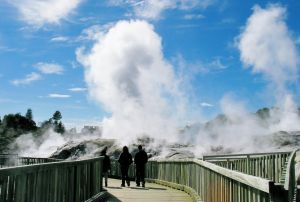Geothermal Energy
Geothermal Energy Basics

Geothermal energy refers to energy that is stored in the Earth’s crust that can be used to both generate electricity and for space heating and cooling. But since its utilisation would require drilling deep below the Earth’s surface, geothermal energy is used for generating electricity only in areas that are rich with hot spots such as Iceland that generates 17% of its electricity from geothermal energy. Regions without hot spots, on the other hand, use geothermal energy for space heating and cooling, using geothermal heat pumps. These exploit the constant temperature below the Earth surface which is 0 to 12 degrees Celsius regardless of the season of the year. In the winter, this constant temperature is taken advantage for space heating and in the summer, for space cooling.
Advantages of Geothermal Energy
-
Cleanness. Geothermal energy is a clean source of energy and an environmentally friendly alternative to fossil fuels.
-
Sustainability. The heat that is produced by magma beneath the Earth’s crust offers a sustainable source of heat.
-
Low cost. Geothermal heat pumps are much more affordable than other forms of alternative energy such as solar photovoltaic panels for instance. They also require little maintenance.
Disadvantages of Geothermal Energy
-
Lack of technology to generate electricity. Although geothermal energy has a great potential to replace fossil fuels, the technology available cannot reach deep enough to be able to convert geothermal energy into electricity. The exception are regions with geothermal water near the surface such as Iceland.
-
The risk of leakage of toxic gases. Utilisation of geothermal energy is relatively simple, however, it requires much more than just drilling a hole deep into the ground. The drilling and installation of the pipes requires knowledge about the location’s geology in order to prevent a potential leakage of toxic gases or damaging the soil’s integrity.
-
Use of electricity. Geothermal heating pump need electricity to extract the heat from the ground. The overall cost of space heating and cooling by using geothermal heating pump dramatically lowers the electricity bills, however, it involves the use of electricity which in turn is mainly generated by fossil fuel burning.
-
High investment for installation. Geothermal heating pumps are considerably less expensive than other green technologies but the initial investment is quite high and takes several years to pay off. Installation of geothermal heating pumps is especially expensive for older homes.